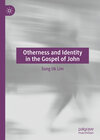
“Lim’s revised Vanderbilt dissertation reads the Fourth Gospel through the lens of postcolonial criticism. ... For those not invested in literary deconstruction and postcolonial criticism, Lim’s work may be challenging. But beyond the methodological questions and assumptions, there are important insights for all readers of the Gospel ... .” (Kent E. Brower, Journal for the Study of the New Testament, Vol. 45 (5), 2023)
“This book will appeal to and benefit readers interested in studies of character and characterization and postcolonial biblical readings of John’s Gospel. … L. is to be commended for this study, which aims to reclaim the suppressed voices of marginalized people in terms of gender, ethnicity, and religion. … Readers will appreciate L.’s articulation of and advocacy for an interpretative approach that can lead to respect, tolerance, and inclusion of difference in our increasingly globalized yet fragmented world.” (Vien V. Nguyen, The Catholic Biblical Quarterly, Vol. 84 (4), October, 2022)
Otherness and Identity in the Gospel of John
von Sung Uk LimIn this book, Sung Uk Lim examines the narrative construction of identity and otherness through ongoing interactions between Jesus and the so-called others as represented by the minor characters in the Gospel of John. This study reconfigures the otherness of the minor characters in order to reconstruct the identity of Jesus beyond the exclusive binary of identity and otherness. The recent trends in Johannine scholarship are deeply entrenched in a dialectical framework of inclusion and exclusion, perpetuating positive portrayals of Jesus and negative portrayals of the minor characters. Read in this light, Jesus is portrayed as a superior, omniscient, and omnipotent character, whereas minor characters are depicted as inferior, uncomprehending, and powerless. At the root of such portrayals lies the belief that the Johannine dualistic Weltanschauung warrants such a sharp differentiation between Jesus and the minor characters. Lim argues, to the contrary, that the multiple constructions of otherness deriving from the minor characters make Jesus’ identity vulnerable to a constant process of transformation. Consequently, John’s minor characters actually challenge and destabilize Johannine hierarchical dualism within a both/and framework.



